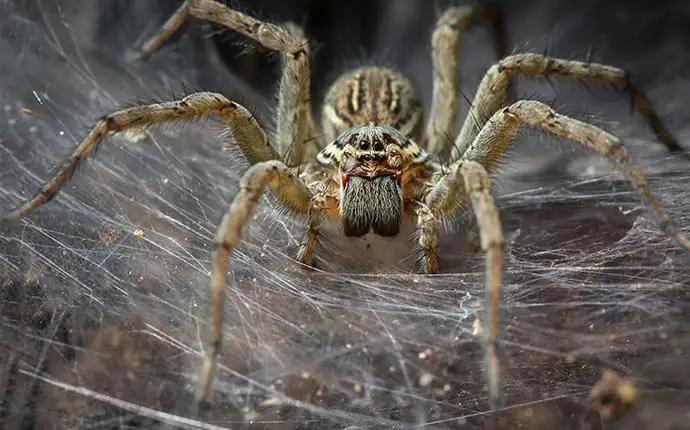Spiders
(Araneae)
What are spiders?
Most people shudder at the thought of sharing their home with spiders, and who can blame them? No wants to look up and see a spider hanging from their ceiling, find them hiding in their closets, or scurrying across their bathroom floors. Spiders are easy for most people to identify; they are a type of arachnid and related to ticks and mites. Spiders and all arachnids have two body segments and eight legs. They also have many eyes and lack wings and antennae. In our area, the black widow spider, brown recluse spider, and wolf spider are species that people can run into either in their yard or home.
Black Widow Spiders
Black widow spiders are shiny and black, and have a telltale orange-red “hourglass” marking on their belly.
Wolf Spiders
Wolf spiders are large spiders with a stout body that is dark brown, or black. Most have cream, gray, or yellowish markings. Their bodies and spiny legs covered in hairs.
Brown Recluse Spiders
Brown recluse spiders are light brown, and adults have a darker violin-like marking on their back.
Are spiders dangerous?
The good news is that wolf spiders and most other household-invading spiders that people come across are harmless. In fact, spiders, unless they take over our yards and homes, are wanted because they help to control populations of nuisance insects and garden pests. However, dangerous spiders are living in North Carolina. Both the black widow and brown recluse pose direct dangers to people. If a bite were to occur from either species, their venom is potent enough to cause negative health effects in people. Care should always be taken not to make contact with dangerous spiders. If you still aren’t sure about how dangerous a spider is this blog has more information that can help: “How To Tell If The Spider In Your Raleigh Home Is Dangerous“.
Why do I have a spider problem?
Spiders are only a problem when they decide to move into our homes, usually while following their prey. Spiders don’t move indoors to escape harsh weather, but they move inside following insects that do. Finding a safe, quiet spot to lay eggs is another reason why many spiders move inside homes and outbuildings.
Where will I find spiders?
Spiders are shy, reclusive creatures and want to hide from us. They choose areas in homes that are quiet and dark and help them to remain hidden. Wolf spiders are large spiders, so they are easier to spot than smaller species. Their large size prevents them from being great climbers, so they move along walls and hide under furniture or in clutter in basements or closets.
Along with both being dangerous spiders, the black widow and brown recluse tend to hide in similar areas in our homes. Basements, closets, attics, crawlspaces, cabinets, and spaces under furniture are common hideouts for black widow and brown recluse spiders. Bites often occur when people are in storage areas moving boxes.
How do I get rid of spiders?
Win the war against spiders and other pests with the help of an experienced professional. At Innovative Pest Solutions, we can provide fast and effective services that that homeowners in the Raleigh, NC area can trust. We get rid of pests and stop them from coming back!
Protecting our customer’s home, health, and the environment are our top priorities. To learn more about our locally owned and operated company and our affordable pest solutions, reach out today! We will be happy to provide you with information about our residential pest control options.
How can I prevent spiders in the future?
To prevent spiders from becoming a problem on your Raleigh, North Carolina property, partner with Innovative Pest Solutions. Also, implement the following tips to guard your home against spiders:
- The best way to avoid problems with spiders is to keep them out of your home by inspecting its exterior and sealing entry points.
- Cut shrubs and other vegetation back to prevent spiders from using branches to gain easy access to your home’s exterior walls.
- Keep outdoor lights off whenever they are not needed because they attract insects that spiders eat to your house. Replace traditional bulbs with LED bulbs that are less attractive to insects.
- Reduce the number of flies and other hungry insects on your property that spiders feed on by placing locking lids on trash cans, recycling bins, and compost bins.
- Inside and outside your home, reduce hiding spots. Keep the grass cut short and remove debris from your yard. In your home, keep storage areas neat and free of clutter.





